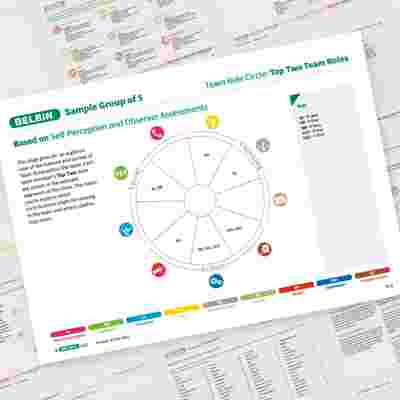Under pressure: how well do you cope with challenging situations?
Pressure. Some people thrive on it; others buckle. But how can we predict someone’s reaction? And if we have an idea of what this reaction will be, how can we help people to develop?
Understanding your coping strategy
Your behavioural make-up is likely to have a strong influence on your response to pressure.
For those who are driven, competitive and enjoy challenges, pressure is beneficial. It enables focus on the goal and deadline, and keeps things fast-paced and interesting.
For others, making decisions in crunch situations can be difficult and stressful, so is unlikely to be conducive to success. In Belbin terms:
- Monitor Evaluators and Completer Finishers share the desire to get things right (on macro and micro-levels respectively), so time pressure is a natural enemy which threatens the success of a project.
- Monitor Evaluators are likely to abstain from the decision-making process rather than be forced into a rushed decision.
- Completer Finishers, who tend to internalise anxiety, may take on increasingly heavy workloads. They’d rather work all hours and let their anxiety climb to unproductive levels, rather than face letting a mistake slip through the net.
Applying the pressure
Pressure can strip away politeness, aspirations, reserve and social codes, to show the real person beneath.
And it has been a part of the Belbin Team Role story from the beginning.
Meredith Belbin’s ground-breaking research, conducted over the course of nearly a decade in the 1970s, explored individual and team behaviours by putting people under time and competitive pressures to expose characteristics that might not otherwise have come to the fore.

The research
In the original research, a group of managers took part in a business simulation.
The exercise was designed to mimic all the problems of decision-making commonly found at work.
The managers were scrupulously observed by the research team, who recorded the behaviours they witnessed every thirty seconds, to build up a broader picture of each person’s contribution.
From these observations, eight of the nine Belbin Team Roles were discerned. A ninth – the Specialist role – emerged when Dr Belbin began using the Team Role model more broadly in industry.
How does your team measure up?
One safe way of funding out is to use the Belbin exercise, Contribute.
Contribute is a Belbin exercise designed to demonstrate the strengths and contributions of each of the nine Belbin Team Roles, developing the team’s understanding of the roles within a learning environment.
Contribute is made up of nine different tasks, involving everything from caption writing to guiding other members of the team onto a sheep pen. Each exercise corresponds with a Team Role and the team must decide who should perform each task. The team’s objective is to collect all nine Team Role awards within a certain time limit.
This exercise helps the team explore its strengths and weaknesses. What did they do when they realised they had no Completer Finishers and five Shapers? How will they overcome the gaps and overlaps in their team when back at work?
What happens when time is running out and they still have three tasks to complete? Do they all help each other, or do they think they think they are better working by themselves?
How do the dynamics of the team change when there is some pressure applied - does all the previous learning go out of the window, or does the team try and use the behaviours they have just identified in each other?
More details can be found here: Belbin Contribute
Contribute in Action
Watch the Oppo team play Contribute and listen to their feedback.

Delving into detail
The Belbin Reports are ideal for exploring individual and team contributions in more depth.
The Reports offer personalised guidance and feedback which can help individuals to understand why they might respond to a given situation in a certain way.
Armed with an understanding of their behaviours and their impact upon the team, they can ensure that they are working and communicating in a way that will maximise their strengths.
The team
Team Reports build on this knowledge, combining individual data to give the team an idea of how their contributions might fit together, and what this means for the rest of the team.
For example, the Team Role Circle provides an overview of distribution of roles within the team, so that individuals can see at a glance where any gaps and overlaps might occur.
Other pages offer information as to who might be best suited to different kinds of work within the team and illustrate where the team might be over-reliant on one individual to represent a particular behavioural contribution.

Next steps
To find out more about how your team cope under pressure - maybe you'd like to find out more about Contribute or the Belbin reports, please get in touch. We're in the office and would love to hear from you.
Call us on +44 (0) 122 264975 or fill on the form below.

Contact us
Please fill out the form and we'll be in touch.